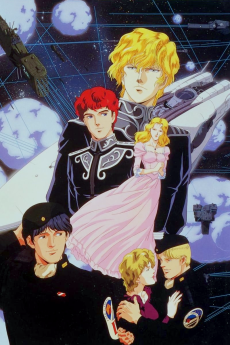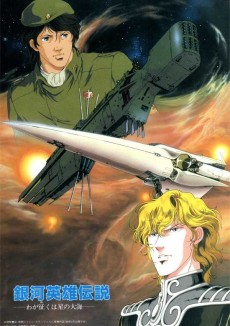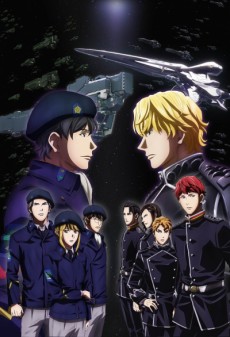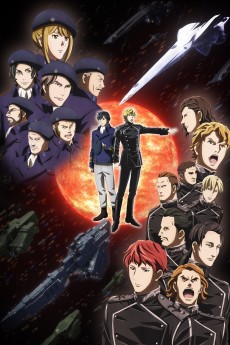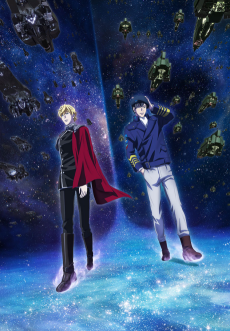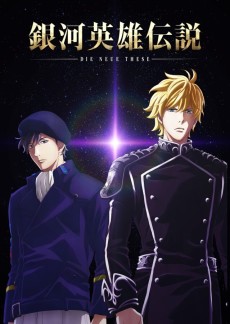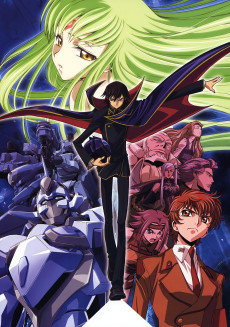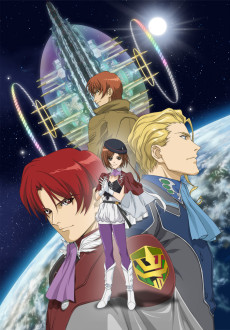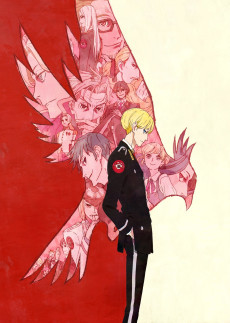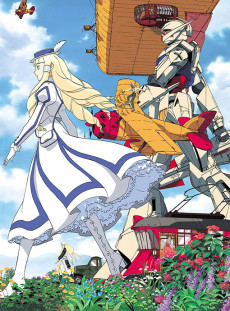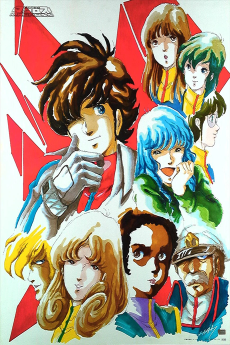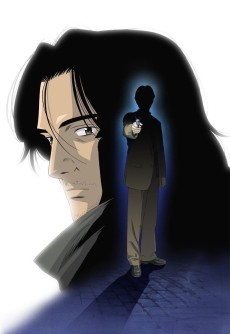GINGA EIYUU DENSETSU
STATUS
COMPLETE
EPISODES
110
RELEASE
March 17, 1997
LENGTH
26 min
DESCRIPTION
For decades, the Galactic Empire has been locked in an interstellar war with the Free Planets Alliance, a conflict that involves thousands of spaceships and millions of soldiers on both sides. Two new commanders enter the conflict with great hopes: Imperial Admiral Reinhard von Lohengramm and the FPA's Yang Wen-Li. As they deal with superiors and subordinates, maneuver through complicated political arrangements, plot strategies, and win battles, each will be tested, and ultimately, changed, by the reality of war.
(Source: Anime News Network)
CAST
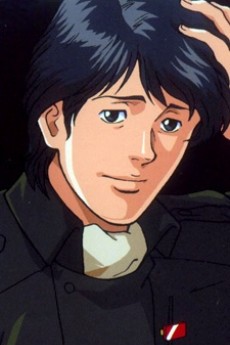
Wenli Yang
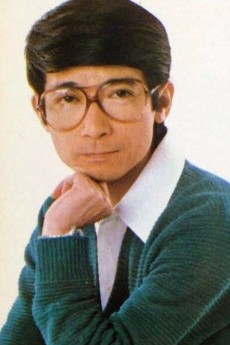
Kei Tomiyama
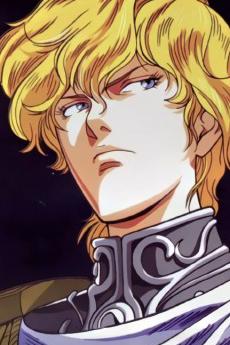
Reinhard von Lohengramm
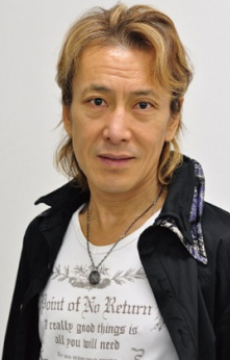
Ryou Horikawa
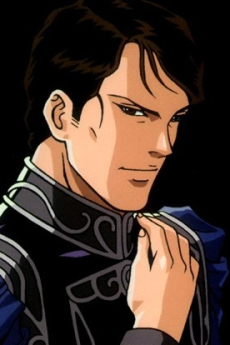
Oskar von Reuenthal
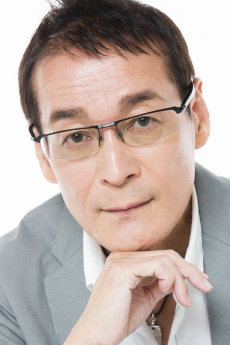
Norio Wakamoto
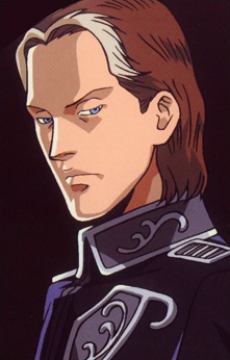
Paul von Oberstein
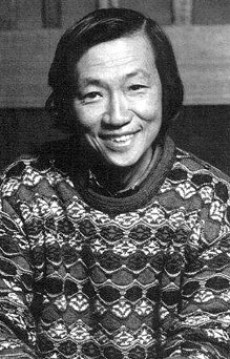
Kaneto Shiozawa
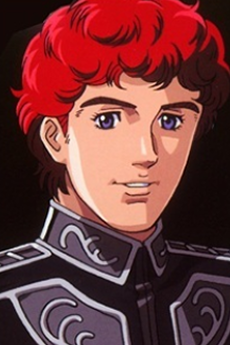
Siegfried Kircheis
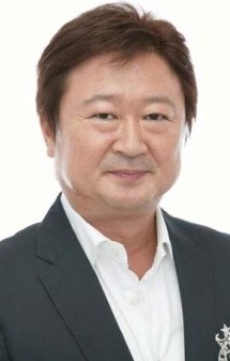
Masashi Hironaka
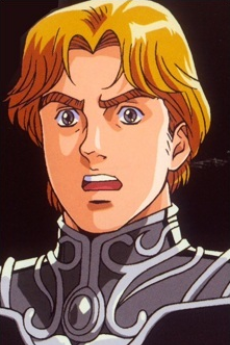
Wolfgang Mittermeyer

Katsuji Mori
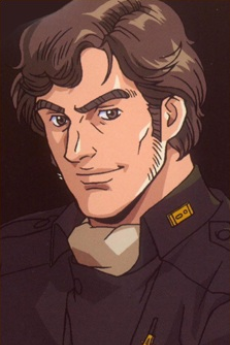
Walter von Schönkopf

Michio Hazama
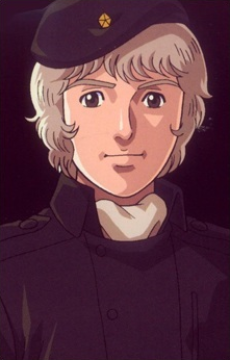
Julian Mintz
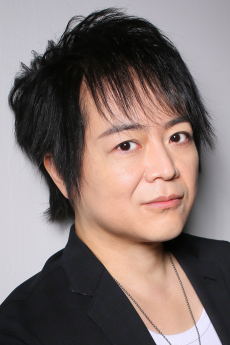
Nozomu Sasaki
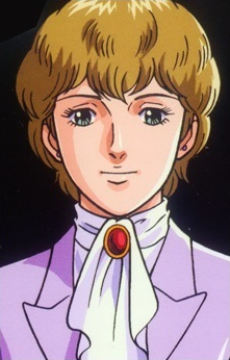
Hildegard von Mariendorf
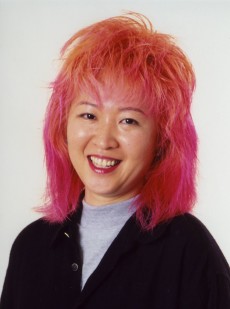
Masako Katsuki
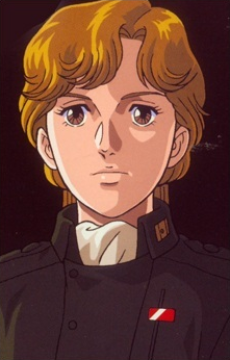
Frederica Greenhill
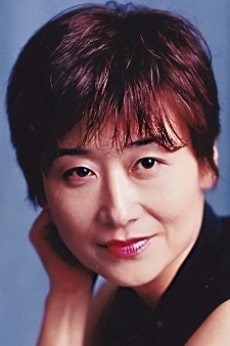
Yoshiko Sakakibara
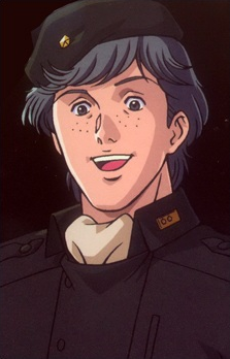
Dusty Attenborough
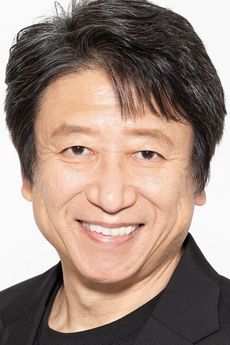
Kazuhiko Inoue
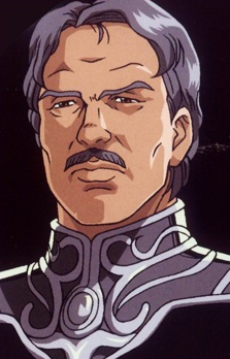
Willibald Joachim von Merkatz
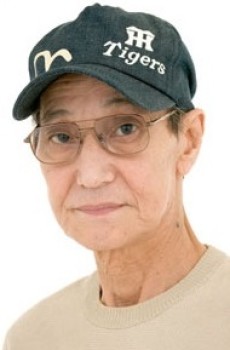
Gorou Naya
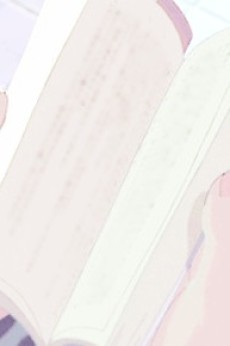
Narrator
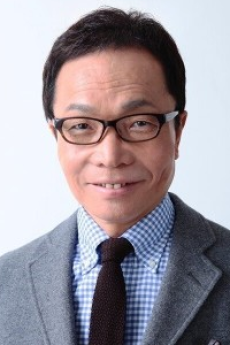
Yuusaku Yara
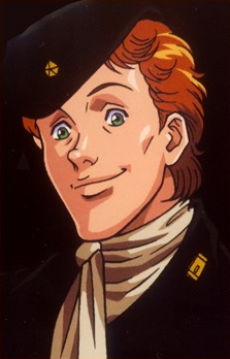
Olivier Poplan
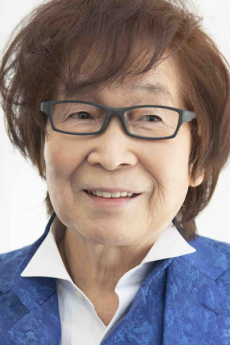
Toshio Furukawa
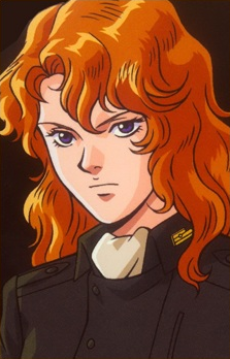
Katerose von Kreutzer
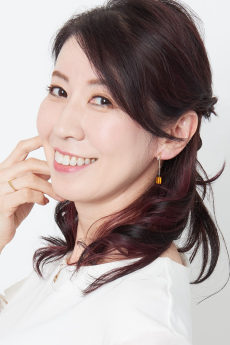
Kotono Mitsuishi
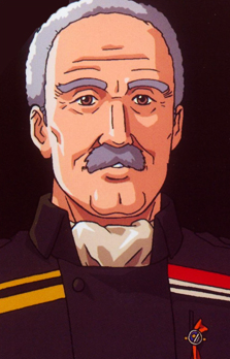
Alexander Bucock

Kousei Tomita
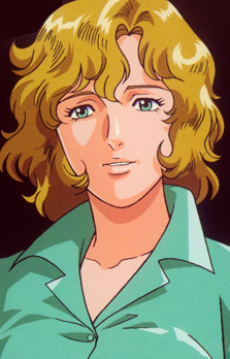
Jessica Edwards

Mami Koyama
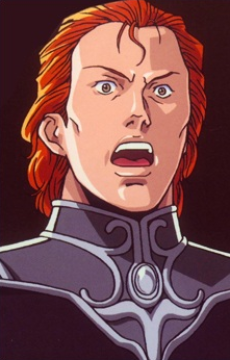
Fritz Joseph Bittenfeld
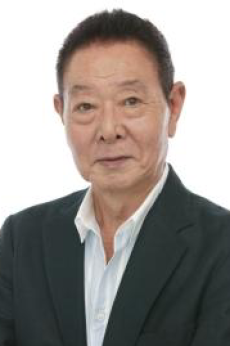
Keiichi Noda
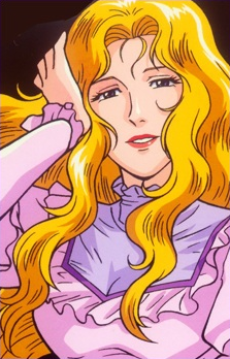
Annerose von Grünewald
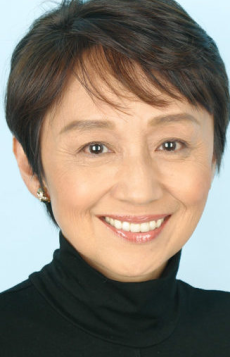
Keiko Han
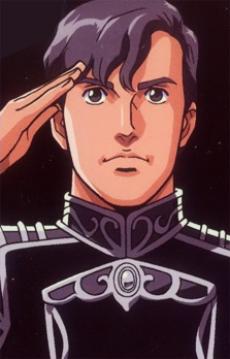
Neidhardt Müller
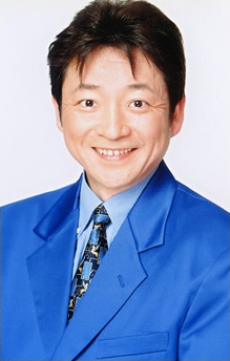
Yuu Mizushima
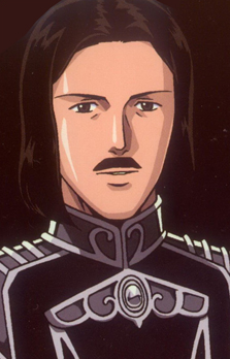
Ernest Mecklinger
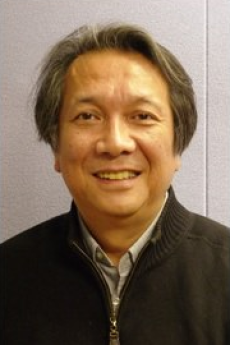
Takaya Hashi
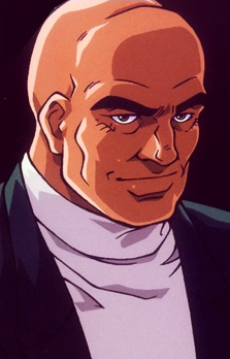
Adrian Rubinsky
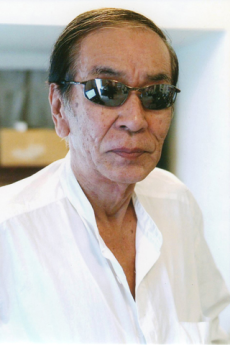
Kiyoshi Kobayashi
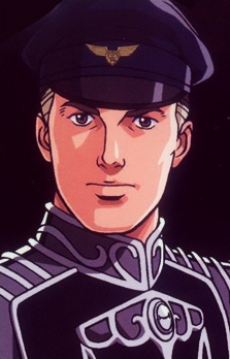
Ulrich Kessler
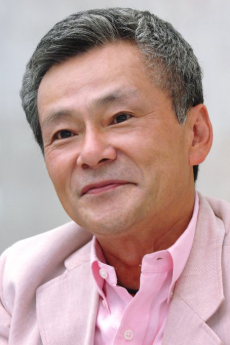
Shuuichi Ikeda
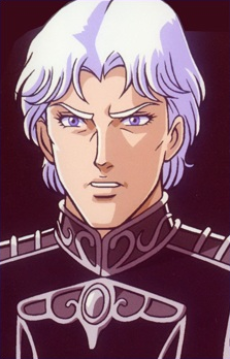
Adalbert von Fahrenheit
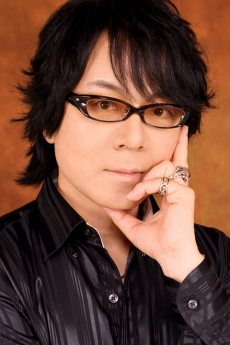
Shou Hayami
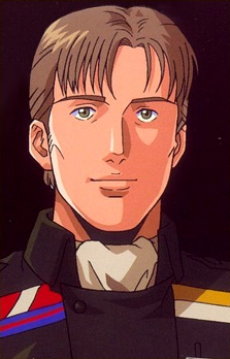
Alex Cazellnu

Keaton Yamada
EPISODES
Dubbed
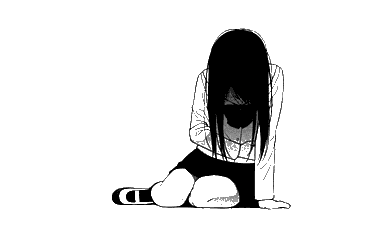
Not available on crunchyroll
RELATED TO GINGA EIYUU DENSETSU
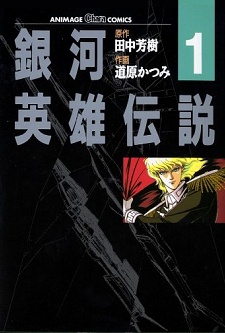 MANGA ActionGinga Eiyuu Densetsu
MANGA ActionGinga Eiyuu Densetsu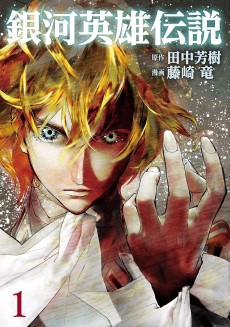 MANGA ActionGinga Eiyuu Densetsu
MANGA ActionGinga Eiyuu DensetsuREVIEWS

Peng
80/100Grand, emphatic, a story for the agesContinue on AniListIf you’ve been watching anime for a while, chances are you’ve heard of _Legend of the Galactic Heroes_. Chances are you’ve heard some pretty good things about it too. The 110 episode OVA series is perhaps one of the most lauded in the industry and has garnered a hefty, dedicated, cult following. So, does the series live up to its reputation? In many ways: yes. And yet, it's far from perfect. Simply put, _Legend of the Galactic Heroes_ could and probably should have been deserving of that coveted title as the medium’s crème de la crop. Despite this, it was not without its flaws. And, few as they may have been, they have a lingering presence on the viewing experience such that they simply cannot be ignored. It’s unfortunate, really, that such an astounding, grand and finely handled show is tainted, however so slightly, by unsavoury elements that really should have been avoided. _Legend of the Galactic Heroes_ is based on a series of novels written by Yoshiki Tanaka, author of another recently adapted series in _[Arslan Senki](http://anilist.co/anime/20935/ArslanSenki)_. It plays out like a history documentary, where indeed, one of the recurring themes of the series is the cyclic nature of history and the self-destructive tendencies mankind is seemingly never able to relinquish, regardless of the era. The OVAs were released between 1988 and 1997 and were directed by the late [Noboru Ishiguro](http://anilist.co/staff/5095/NoboruIshiguro) (_[Space Battleship Yamato](http://anilist.co/anime/711/SpaceBattleshipYamato)_, _[Macross](http://anilist.co/anime/1088/Macross)_) and was predominantly animated by Studio [Artland ](https://anilist.co/studio/8/Artland)(_[Mushishi](https://anilist.co/anime/457/MUSHISHI)_). Enter the 36th century. The galaxy has been split into two major powers: the autocratic Galactic Empire and the democratic Free Planets Alliance. The autonomous planet Phezzan, a commercial epicentre, is also heavily involved in subterfuge. The Empire and the FPA have been engaged in an arduous war of attrition for the last two centuries. However, this might change given the meteoric rise of a certain ‘blond brat’ within the Empire – an ambitious young fleet commander of a lesser noble heritage and a battlefield strategist of unprecedented brilliance: Reinhard von Lohengramm. Conversely, a legend has emerged from the ranks of the FPA in recent years – the ‘hero of El Facil’, the ‘magician’ and a military genius who simply wants to nap away his afternoons with a healthy dose of tea and brandy: Yang Wen Li.





Whilst its flaws cannot be dismissed, _Legend of the Galactic Heroes_ is a phenomenal achievement for the anime medium. It handles war, politics and morality with a finesse that most other shows can only envy. It presents a vivid narrative and generally well-written characters, which is all the more impressive given the scale of the story and cast. It is grand and alluring, a true testament to the potential of the space opera and war epic genres. It is ultimately fitting that a series about history has had such an historical impact on the medium itself, and although it dropped the bar at times, it raised it for anime in general. ‘In every age, in every place, the deeds of men remain the same.’ 
Goukeban
79/100Good? Yes, but far from being the pinnacle of anime.Continue on AniListFor a while, some of the people who I usually talk to on MAL have come to claim that I am some kind of contrarian, due to my refusal to shout unconditional praise for some works considered to be “classics” in the same fashion a few circles do. I don’t feel that is true, though, when taking into account my general stance (just look at my other reviews!), it just so happens that I have a very particular way of judging any given work, hipster glasses off. For that same reason, when I began watching Legend of the Galactic Heroes, or Ginga Eyiuu Densetsu, I tried to free myself from any external preconception, so that by the end only my own judgment would be as fair a result as possible, coming only from my own perspective and no one else’s. Currently, the anime sits at 8th place among the highest scored titles on MAL, with an average score of 9,10, so you might imagine that analyzing it is kind of a big deal. It also has a somewhat small but quite dedicated audience that takes it in very high regard, besides being a generally respected work. This is the point where the petulant me raises his voice among the crowd to say “Well, I have some disagreements to make here!”
Just for fun, I’m going to call this one GED, because fuck me if I had to write any of the acronyms the series has whenever I need to refer to it!
Story and Characters
Oh boy, this one is a beast! As you might imagine, properly tackling a show like GED is not necessarily an easy task if you plan on doing it in depth: it has a total run time of 110 episodes, the storyline is divided into two main fronts, a fair share of it is dedicated to politics and it’s fucking packed with dialogue! For the sake of my sanity (I still have it, don’t worry!), this will be another review where I’ll tackle the different aspects of the series separately, in order to voice praises and criticisms in an easily digestible way. By the way: due to its scope and the themes the series tackles, both positives and negatives are heightened in the big picture, so if it seems that I’m being overly harsh to poor GED, keep in mind that there are equally strong positives to help mitigate the issues I’m about to discuss, and people have talked to death about such positives, so allow me to be somewhat picky this time.
The best way to begin this will be to address who are the main forces at play in the story, so let’s get to them. Two major forces are at war in the universe of GED: the Free Planets Alliance and the Galactic Empire, represented by Yang Wenli and Reinhard von Lohengram, respectively, the two characters to receive major focus from the narrative. The two develop a rivalry between themselves and the presence of one in the battlefield is bound to call for the other. Starting with the Alliance, Yang Wenli is the tosser who hates coffee. I’m sorry, there’s more to his character, but I still can’t forgive him for that posh attitude. Yang is laid-back, somewhat lazy, quite introspective and has a strong devotion to the concept of democracy. This last trait is highly emphasized by the show, although it tends to get quite overbearing at some points, making his character come off as very preachy. In these instances it seems like he is more of a mouth-piece of the concept itself, because besides spouting general observations about history, he's not very effective at defending why democracy is the better system. Humm, I wonder if this is what people who hate Urobuchi mean when they criticize his characters.
 __At least the man knows friendship is something to cherish.__
__At least the man knows friendship is something to cherish.__Close to Yang is Julian Minci, a teenager who lives under Yang’s tutelage after losing his parents, who shows to be highly curious and with far more active and responsible demeanor than Yang. Julian is mostly relegated to secondary role, but around episode 82, when the rivalry between Yang and Reinhard is resolved, he becomes the focus on the Alliance’s side. Episode 83, by the way, has a particularly great character moment between Julian and Frederica Greenhill, Yang’s wife, who decides to take political responsibilities after spending most of her screen-time being just an add-on to the plot. For the most part, it seems that his arc is going to be that of becoming just a doppelganger of Yang (seriously, he begins to speak and monologue just like Yang, at some points), up until near the end of the series, when he takes action to be an agent of change in the manner Yang is not capable of. Also close to Yang is Schenkopp, captain of the Knights of the Rose, an elite group of soldiers feared in combat. Having been born in the Empire, but exiled from there still in his childhood, Schenkopp works as the practical balance to Yang’s over-analytical personality and often offers him questions in regard to the validity of his believes.
On the Empire side there is Reinhard, a young, authoritative and slightly idealistic but still down to earth rising military prodigy (on the anime’s standards, that is!) who decides to make a name during the war in order to garner power and influence so he can one day save his sister, who was taken as a concubine by the emperor, as well as overthrow the current ruling force of the Galactic Empire and reform the rules of the galaxy. It’s visible that some of the influence held by Reinhard at the beginning comes from the preference the emperor has for his sister, but that is also supported by his talent and effectiveness in combat. Reinhard hates the nobles and the current ruling dynasty, the Goldenbaum, and his desire to be the next regent puts a target on his back, as he gains the contempt from the nobles. The emperor could not care less, funny enough, the guy just wants to enjoy life and wait for death. The closest friend of Reinhard is Siegfried Kircheis (I’m starting to get a slight bias against Germanic names!), a man who has been in love with Reinhard’s sister, Annerose, and vows to help him conquer the galaxy. Kircheis is extremely loyal to his friend and serves as his moral compass at the start of the series. His influence decreases as the series goes on, though, and that brings the most visible changes in Reinhard’s character, making him more ambitious and prideful. In case you are wondering, this is a positive.
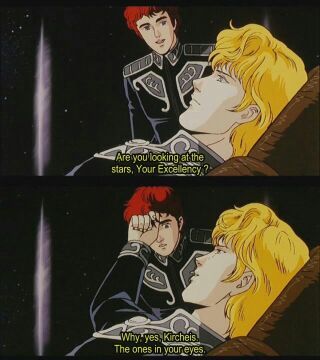 __Unleash the Fujoshis!__
__Unleash the Fujoshis!__Next in the line of influence is Oberstein. He is cunning, stoic, an absolutely deceiving bastard full of dubious intent who constantly challenges the viewer into pondering what his real intentions are. In other words, Oberstein is amazing, the best character in the show, every moment he’s on screen is a better moment and if you disagree you are just flat out wrong. I’m not biased. Due to his methods of getting results, he is compared to a medicine that creates strong adverse effects and garners a great amount of distrust and hatred from other officials. Bunch of ungrateful fucks! His character offers a great contrast to that of Reinhard. While Reinhard is good natured at heart and charismatic, he is still ambitious for glory and cherishes the pride of battle, which are heroic traits on the surface, but still result in the deaths of millions. Oberstein, in the other hands, is not afraid of being hated, seen as the bad guy and of using methods that are considered cowardly or dishonorable, but still minimize damage and the loss of lives.
 __He knows how to surprise even his superiors!__
__He knows how to surprise even his superiors!__
From Reinhard’s admirals, the most notable ones are Mittenmeyer and Reuental, two close friends who share their leader’s disdain for the nobility. While Mittenmeyer is optimistic, strongly tied to family and somewhat naïve with politics, Reuental is dreary, cynical and ambitious, which makes some of their interactions almost comedic in the way that Reuental reads into other characters in a manner Mittenmeyer is oblivious of. The remaining officials under Reinhard’s command are very straight-forward and simplistic characters, but they have just the necessary amount of depth for the position they occupy within the narrative, which is not detrimental to the series. Let’s be honest, folks, would it really be important to have Bittenfeld or Lennenkamp be fleshed out any more? On the side of the Alliance, though, I’ll not forgive Poplan, that guy needed a major overhaul in writing. He appears frequently enough to be a relevant character, yet 90% of his dialogue is of the same breed: remind the audience he’s a womanizer, crack a joke about him being a womanizer and occasionally take a cheap jab at Attenborough. This is not quirky, this is one-dimensional!
The biggest drawback for GED in the character department is the antagonists. While the bulk of the conflict revolves around Yang and Reinhard’s rivalry, a sizeable portion of conflict also comes from specific antagonistic forces acting against each one specifically, or against both at once, like Rubinsky and the Cult of Terra. The problem with such antagonists, though, is that, except for Rubinsky, they are poorly written, one-dimensional, severely deficient on the brain-department and meet their end in anticlimactic fashion. Now, you may ask why I’m being critical of the antagonists being lackluster while cutting some slack for Reinhard’s officials, so let me clarify: conflict is what moves a narrative; therefore if the agents who bring forth that conflict are subpar it damages the work as a result, as it implies that not enough thought was put into that aspect of the story.
The biggest offenders, when it comes to characterization at least, are the corrupt politicians from the Alliance who decide to go against Yang. Most of them are not even characters themselves, just plot devices that appear in the narrative in order to bring trouble upon Yang, having absolutely no logical reason to do so. They have nothing to gain from throwing the guy under the bus, ESPECIALLY once the war has ended, and no justifiable reason to go against the one who was their biggest asset during the war. For all intents and purposes, they are shooting themselves in the foot out of pure irrational spite. The ones who get some semblance of characterization are shown to be pathetically easy to manipulate buffoons with no vision of the danger they willingly throw themselves into because of unfounded fears. On this side of the galaxy there is also the Order of the Patriotic Knights, who are big offenders of logic. This order is a known terrorist group, under the control of Truniht, the Alliance’s major asshole, and yet they are somehow seen making public speeches and attack dissident voices in broad daylight, at the exact moment it would bring more attention and raise suspicions about their connections to Truniht (just see episode 03).
 __Hi, we've heard you need a plot-hole, so we got one fresh out the oven!__
__Hi, we've heard you need a plot-hole, so we got one fresh out the oven!__Against Reinhard there are the nobles from the empire, who see on him a threat to their position, this one at least being a grounded and logical fear, as Reinhard genuinely wants to reform the empire and bring an end to the nobles’ abuses. These nobles, however, are fundamentally one-dimensional characters. Think about the very stereotypical picture of an entitled douchebag noble you’ve seen plenty of times in fiction and you’ll get exactly what these characters are. They show absolute disdain for the lower classes, see themselves as having some sort of inherent superiority, similar to kings who saw themselves as chosen by God in centuries past, are easily prone to act recklessly and blatantly stupid when their pride is hurt and, when cornered, become absolute cowards. No wonder they are the first ones to go down.
 __That's right, Reinhard, don't inspect the enemy who just came him the room pushing a massive coffin! __
__That's right, Reinhard, don't inspect the enemy who just came him the room pushing a massive coffin! __Acting against both sides you have Rubinsky and the Cult of Terra. Rubinsky is the feudal lord of Phezzan, an independent planet whose economy is heavily based on trading between the Alliance and the Empire. He happens to be the antagonist with the better characterization, being treacherous, ambitious, karma-savvy, but still highly self-aware and with a hint of spite on his tongue. Sadly, Rubinsky is not immune to stupidity, as his major plan during the mid-section of the story suffers from a major flaw that the audience can see coming from 10 miles away. Seriously Rubinsky, did you really not expect Reinhard to come rudely knocking on your door so he could get to your neighbor of the other side? Ultimately, though, the major issue with Rubinsky is that he becomes simply a plot device by the end. He appears when needed during the second half to instigate some conflict, which will turn out mostly ineffectual by the end, and when that role is exhausted he is simply discarded by the narrative.
That same fate is shared by the Cult of Terra, the agents of several plot-relevant events throughout the series. In essence, the cult is a religious group who sees Earth as a sacred land and holds the restoration of its power and relevance as their ultimate goal, an objective they are willing to use terrorism to fulfill. While the main goal and core belief of the group is clear, the nature of the Cult of Terra as a religion is fundamentally left unexplored. Here is something that bugged me as I watched the series: why do people even join this cult? Earth, by this point, is a completely irrelevant planet, populated by just a few million people and with very little natural and technological resources, so making it the center of humanity again would be unfeasible. This even raises inconsistences as to how did the Cult have enough money to finance the rise of Phezzan as an independent state. Aside from that, the ideas that could make the cult attractive to people around the galaxy are never explored, its fundaments never brought up. The entire religion serves as nothing more than a generic antagonist, complete with an unfaithful douchebag leader and servants willing to blindly sacrifice themselves with no prospect of victory, so it’s easy to conclude that the religious aspect was implemented simply because it was the easiest to insert without raising as many questions as some other brand of villain would. Religions act based on faith, so who cares if it doesn’t make sense within the story anyway?
 __The terrifying might of the Cult of Earth__
__The terrifying might of the Cult of Earth__For the sake of comparison, look at the religion of Vodarac in Eureka Seven, or the Church of Yaldabaoth from Arslan Senki, another of Tanaka’s works (I don’t even care if you think it isn’t a good series, the parallel is valid!). In Eureka Seven, it’s explained about the meaning of the concept of Vodarac, its connection to the Coralian and what it means to its believers, as well as the effect of it in the narrative and the way it ties to the faith itself. In the case of the Church of Yaldabaoth, being the world of Arslan Senki one with rudimentary science, it’s logical that people would attach themselves to a religion that seeks to explain the universe, especially one that is the official faith of its nation and holds executing “infidels” as common practice. In both series the reasoning for people to join the faith is clearly defined and doesn’t raise contradictions in regards to their role within the story. Taking Earth out of the equation, the Cult of Terra could easily be turned into a terrorist group with political motivation and their role in the series would have been essentially the same. Throughout the series, the Cult continuously loses power, until it decides to do a desperate attack and is finally ended in anti-climactic fashion.
Speaking of political motivations, let’s talk about something where the series excels at. A very commendable trait of GED’s depiction of politics is that it doesn’t depict only the game of power, but it also includes the human factor within it. Paying some attention to modern and old politics will show that personal beliefs, morally influenced ideologies and the desire to be an agent of good play a role in governments almost as big as the standard game of interests and intrigues. Not to say that the series leaves aside that aspect either, you can easily see that at play within the nobles of the Empire and even more within the Alliance, where corrupt politicians abuse power in order to manipulate media and keep their levels of influence. If you’ve read various analyses of the series, you might have heard a few times (or many, as I have!) the main question it brings up: what is better, a corrupt democracy or a just autocracy? While the characters on the Alliance side, or at least the good ones, are very devote to the principle of democracy, as it’s in their belief that a govern that still has to bow to the people’s will is fairer, the show itself seems to have a slight bias towards autocracy, perceptible in the way it treats Reinhard’s actions and the effect of his government.
Another trait that is commonly highly praised by the fans of GED is its battles, both in the epic scale present in them, as well as the strategies in display. Sadly, this is another aspect I’ll have to criticize. There are issues in the depiction of battle tactics, in the presentation and in the writing itself. Let’s start with the strategies. I suppose video-games don’t exist in this distant future, since even though these battles take place in space, where they would have freedom to position and maneuver fleets in all directions, nobody takes advantage of the z-axis. The vast majority of space battles take place in a strict two-dimensional plane, and you can count in one hand the amount of instances someone remembered they could move up or down with their massive spaceships. This leads to the most glaring problem: the vast majority of the tactics used are predictable and simplistic. What can eventually break the monotony is the introduction of futuristic elements, like Zeffir particles, but for the most part such strategies involve just fleet positioning that Hannibal would consider just part of a beginners guide: multiple times it’s visible when the some fleet (usually lead by Attenborough) is retreating to lure the enemy into their plan, or when one fleet is about to be surrounded by the enemy, the biggest offenders in this case being Bittenfeld and Fahrenheit in episode 79. There’s another aspect to this issue, but this one I’d like to discuss when talking about the presentation.
Eventually, this creates a disconnect between what is show on screen to what the show keeps telling us in regards to Yang and Reinhard’s supposed strategic brilliance. For my money, I’d bet on Bucock being the one that truly displays to be an strategic mastermind, as even though he only leads two battles, both of them are masterfully conducted. In both instances, Bucock makes excellent use of the scenario surrounding the troops, predicts enemy movement, leads them into successful traps and manages to hold off vastly bigger armies. For all accounts, he only loses because the plot demands so. GED actually makes a strong case for the value of experience against natural talent, if you look at it that way, as Merkatz also shows to be a much more cunning military leader than his young counterparts.
When it comes to issues with the writing, it’s visible on how the usual antagonistic forces that get in the way of the main heroes are defeated by their own incompetence, to a point that can sometimes become contradictory to what their characters are supposed to be. When faced by Yang or Reinhard, it’s not uncommon for admirals and generals to commit grossly amateurish mistakes that the audience itself can see through. Here is an example: one of the first battles in the series, designed to “prove” Reinhard’s genius, is one where his fleet is outnumbered AT LEAST 3 to 1 by the Alliance’s army. Sounds impressive, doesn’t it? Now here is a question; if you are close to engaging the enemy in combat and your troops have vast numerical superiority over theirs, how do you proceed: position your army in a manner that allows you to quickly surround and dispatch the enemy forces, minimizing damage taken and preventing them from escaping, or you separate your soldiers in troops small enough to be inferior to your enemy and position them in a way they can easily be picked apart and destroyed? Because this last one was the method chosen by the Alliance’s fleet. By all accounts, Reinhard took the advantage not because of any brilliant strategy, but because of his enemy’s crushing idiocy. I say that these are issues with the writing because, being such characters experienced commanders, such rookie mistakes should be out of the equation if the idea is to highlight the efficiency of the main cast or make the antagonist seem like even slightly competent characters.
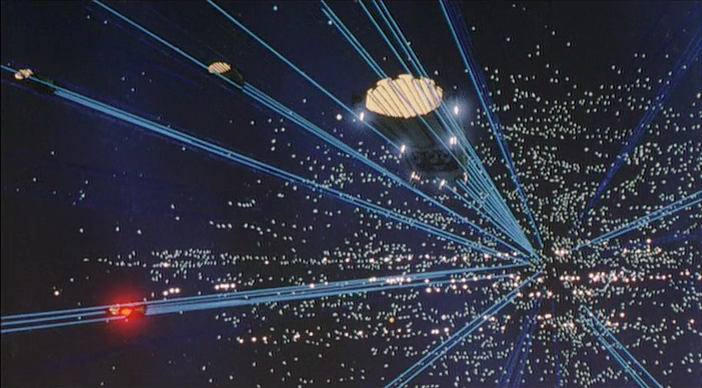 __See if you can find who you care about in the middle of this mess!__
__See if you can find who you care about in the middle of this mess!__The last issue I’d like to discuss in this section is the role of the narrator within the work. Now, the existence of a narrator in a work like this is not an issue; when you have a large universe with organization far different from what your audience is accustomed, it’s natural to include narration to ease your audience in, so that the elements of the story don’t come out as jarring. The problem with the narrator in GED, and this is possibly the most pervasive issue, is how overbearing it is. This obnoxious prick constantly chimes in the most varied situations to give away stuff that could be easily inserted within dialogue or individual thoughts without compromising the narrative, when he’s not giving away bafflingly pointless details. He blatantly spouts what the characters are feeling and thinking at certain moments, he narrates actions and emotions the exact moment after we saw the characters act it on screen, adding nothing to the scene (“Not being able to defeat Yang, Bittenfeld got extremely irritated” thanks, by I noticed that on my own!), he even feels the need to tell how many spoons of soup Reinhard ate! His is also one of the voices you’ll hear the most during battles, as they frequently opt to have days take place within an episode with only the narration explaining the events. This problem has a lot to do with the source material the anime was based on, the novels: that overbearing style of narration and the way certain events of the story are paced within the narrative are very characteristic of how a novel is written. The issue here is that GED was not translated from one media to the other in any smooth fashion, even as an anime, it retains a style of narration that is not fit for this media specifically. Since anime is an audiovisual media, it benefits more from having the scene and the characters themselves show what is going on, not having it spelled out for the viewer.
Presentation
Let’s be honest, folks: taking into consideration the amount of whisky, wine and beer consumed by these characters, I’d say half of the main to secondary cast should recognize they have some sort of drinking problem! I can’t be the only one who sees that!
Ok, going back to the space battles, let’s talk about that last issue I mentioned. As you watch the series, you’ll most likely notice these battles are presented in two manners: the first one, obviously, are those where we get an overview of the combat, with the massive spaceships firing at the enemy and hundreds being blown up in both sides; the other one is the fleet movement being displayed in the monitors and commented. The first point of contention here is the way the action displays how these battles evolve: the sequences of lasers getting fired are not enough to convey the flow of the battle, so most of the information about the combat is relayed by the characters in command, making the action itself lackluster. These sequences lack the flare that traditional action sequences have and it took me a while to understand why, but I would, controversially, say that the scope is the source of the issue. The numbers are all so high, counting on dozens of thousands of ships and millions of soldiers, that the series has difficulty properly framing that within the combats and simply displaying random ships being blow up doesn’t cut it, it’s not enough for the viewer to understand how those particular vessels being destroyed is in anyway meaningful to the big picture, when so many of them are shown in every battle and rarely anyone important is in them. Also, just looking at enormous ships far apart from each other be destroyed doesn’t pack the same variety and creativity seen in traditional action sequences the media can provide, like gunfights, swordfights or the tried-and-true mecha-battles, so the combats in GED don’t take long to seem somewhat “samey”.
 __Riveting, isn't it?__
__Riveting, isn't it?__Let me get a bit light with the bashing, though, I can feel the target on my back itching. If you wanna know about the animation: it’s pretty good, son. It’s distinct, not featuring the most common visual tropes associated with anime, characters have varied designs, making it easily to distinguish them immediately and the series generally packs a unique visual identity, setting it apart within the media. Sometimes you can see a few shoddy frames, but the work generally has very stable animation quality. One aspect that might be divisive when it comes to the visual presentation is the Imperial’s infatuation with 1800s style fashion, architecture, furniture and pretty much everything else. Seriously, they even use gold coins to bribe a guy at one point! Whether you find this particular visual identity goofy, thematic relevant, stylistically clever or just plain unnecessarily is up to you, but it does raises some questions in regards to world consistency and logic. It took me 42 episodes to see the first security camera on the streets of an imperial city, for once, while none seemed to be present at the Emperor’s residence. When in focus is on the military aspect, though, there’s care put into making the pomp of each rank translate into their appearance, with uniforms distinct to common soldiers, generals, admirals and so forth.
You probably want me to talk about the soundtrack, which is composed of classical pieces, but here is the problem: I barely notice them! Perhaps that is because I was so focused on the dialogue and plot that I happen to miss them, but I generally could not remember the pieces that played throughout the series. Same can’t be said about the voice acting though, which is packed with classical voices from anime, like Shiozawa Kaneto (Rei, from Hokuto no Ken), Inoue Kazuhiko (Cyborg 009, Kakashi, etc), Horikawa Ryo (Vegeta) and Sakakibara yoshiko (the Puppet Master, from Ghost in the Shell), pulling their A-game here.
Personal Ramblings
It’s clear to many that, while critically acclaimed, GED is also somewhat of a niche product, so let’s do that exercise I like to bring up and try to understand why it garners such reputation. For once, the audience who composes fans of the series seems to be composed mostly by people who are drawn to older works, so having started in the late 80s certainly gives it that old-school appeal. The series also has a distinctive aesthetic that is a clear departure from the standard anime-look, even for the time it began serialization. That aesthetic possibly helped sediment it as a work of clearly serious tone, appealing for those who looked for something of more mature look within the media. Adding to that, the characters are mostly adults, certainly appealing for anime-fans who are somewhat tired of the overreliance on teenage/kid characters that we see throughout the media. Lastly, the theme of politics is one that is not seen so often even in other media, and seeing it being tackled gives an intelligent vibe to shows that are able to handle it properly. Also helps that the entire work is design to have a very classy feel to it.
This might not be the most accurate assessment to make, but I believe most people tend to look at anime only focusing on the big picture: the most surprising twists, the main actions protagonists partake, the big events in the plot. Looking solely at the big picture, Legend of the Galactic Heroes sure is an impressive work: whole solar systems are involved in the conflicts, battles feature impressive large numbers, it has long spamming plans taking place, deals with an universal concept and its main characters are noticeably treated as larger-than-life people (none of them up to Samus level, but hey, they do their best!). However, I think that when you look at it with your mind on the details is that the nuances, real qualities and flaws become a lot more noticeable, and when it comes to Legend of the Galactic Heroes, its qualities are surely strong and worth comenting, but its flaws are also quite persistent for it to be among what I consider to be the very best in anime.

WanderingSage
98/100Space opera done right. Must watch series.Continue on AniListLegend of Galactic Heroes (LoGH) is one of my favorite shows in any genre. There can be a tendency for fans of certain anime to overly praise things that aren’t that great as some kind of “too deep for you to get it” masterpiece of writing, so I was a little wary heading in to this one. It turns out that in this instance, the brigades singing a show’s praises are (for the most part) absolutely right.
Shows like this are a balm for anyone tired of the endless parade of cute girls doing cute thing shows; or tired of watching shows where the protagonist ends up being a lazy, whiny, good for nothing who just has things in life handed to him or her for no discernable reason. This is a show about galactic history being made and unmade by great men and women and the difficult decisions that accompany all such struggles.
LoGH, when approached with the right mindset, is one of the best space operas that has been put on film. While it’s not perfect (what is?), it is one of the best animated fiction stories that I’ve had the pleasure of sitting through.
There are some problems and challenges with the show, and these may end up making the show tough for some to watch, so I figure I’ll get these listed and out of the way.
1.) The artwork and animation are dated. While I don’t think that this is a show that needs to rely on flashy visuals to tell its story, this is a 30-year-old anime and shows its age.
2.) This is a dialogue heavy anime. There are a great many scenes where major characters sit around drinking, philosophizing, scheming, and occasionally bullshitting around. LoGH tells its story to you through these conversations and doesn’t rely heavily on narrative recaps or other exposition. Exposition is there at points, but this is a show that you have to pay attention to in order to understand what characters are thinking and doing. With the dated visuals and animations, this isn’t going to be a flashy style over substance show.
3.) This show demands a lot from the viewer. While I think that anyone can enjoy the show if they enjoy a space opera, the more historically educated the viewer is, the more they will get out of the discussions. (Knowing a bit of Prussian history helps a LOT with understanding the Galactic Empire for example). You aren’t going to be pandered to with nonstop flashy action sequences (see problem 2) so it’s a little tough to turn your mind off if that’s what you want to do.
4.) At 110 episodes, this show is an investment of time. While there are a lot of shows out there that go longer than this, those looking for something quick and light to watch aren’t going to find that here. This series takes its time to build up the characters, factions, history, and battles. I feel that this show is worth the investment, but some people aren’t going to like the fact that it’s going to take quite a few sessions to get through this one.That out of the way, regardless of one’s preconceptions, if you have any serious interest in history, political philosophy, space opera fiction, music and its role in narrative, or heroic character studies, then you owe it to yourself to watch this show. As I said, this show isn’t perfect, but it’s a tour de force that becomes greater than the sum of its parts the more you dive in and invest your time. There are other shows that can do certain of the themes I mentioned earlier in this paragraph better than the way that LoGH does, but it’s very rare to find a show so well rounded and constructed that it ends up doing all of these things at such a consistently high level.
Without spoiling anything major, at a broad stroke the series is about the political and military confrontation of an autocratic Galactic Empire and a democratic oriented Free Planetary Alliance group in the major arc. There are other minor political/economic interests that have their own loyalties and diplomatic ties, specifically a nominally neutral trading alliance based between the two major factions, as well as a religious cult that operates behind the scenes and has its own agenda and goals.
What makes the show as compelling to watch as it is has a lot to do with the fact that we’re watching case studies of great men who struggle against their factions decaying political institutions. It feels like you are observing great history in the making, being along for the ride if you will, following interesting characters who very much become heroes in the classic sense of forging their own destiny and trying to remake their world and their place in the universe. There’s a bit of Joseph Campbell in here, as well as Machiavelli and the other greats of politics to deal with as well, but it’s up to the viewer to discover the themes themselves.
I think that the beauty of LoGH is that it doesn’t come right out and tell you that one faction or way of doing things is “the correct way”. Much dialogue is spent debating the merits of democracy vs. autocracy and the major players in this historical drama each have their own opinions and are well versed enough to engage in the ramifications of each system and its strengths and weaknesses.
There is also a distinct level of respect and decorum towards the other faction that harkens back to earlier times in our own history where opponents were treated with dignity and honor. This ends up doing the viewer a great service by not reducing the different sides to an obvious paragon of all that is good and virtuous, and their cartoonish villainous counterpoint who manifests all that is wrong and evil and probably kicks puppies for fun.
LoGH doesn’t seek to spoon feed you the answers or give you an obvious team to “root” for. LoGH respects your intelligence and lets you watch and make your own decisions as there are good and bad folks on each side. It also does this in a way that one doesn’t need to be versed in multiple languages to read the original works of the great philosophers and political thinkers to have an understanding of what’s going on either. The show’s dialogue ends up being presented in a way that those who don’t care about reading up on history or politics can easily follow along perfectly well. It can also be appreciated on a different level if one does understand these things as well. Even having a good knowledge of classical music and how the pieces tie in to the mood and what’s going on screen, while unnecessary to enjoy the show, will open up another avenue of enjoyment that one could explore as well. The show layers this complexity in a way that never reaches the heights of pretentiousness that some other pieces end up wallowing in. There’s little that’s shown that doesn’t end up building the narrative or fleshing out characters in a reasonable manner.
With regards to the great characters of this show, they are almost too many to list. Yang Wen-li and Reinhard von Lohengramm are great faction leaders. These are great men by deed and accomplishment, but also have realistic and somewhat tragic weaknesses that make them human and, in many ways, relatable to us. They are also the two premier military minds of their respective factions and watching their strategies unfold is great. That’s not to say that these two steal the show all the time, however. There are other great characters that all have their own development and strengths and weaknesses to work through. You’ll have favorites and those who are memorable as the show goes along. The voice acting is great and emotional, and in a dialogue heavy show like this, that’s a blessing. There are a ton of great voice actors in this, and they do a great job of making their characters and their personalities come to life.
LoGH doesn’t pander by having characters act in ways that are outside of their character (at least not very often) for plot convenience. Characters who succeed one show by aggressively attacking may end up being hoisted by their own petard in a later episode by acting in a similar way. Most of the characters follow their principles whether or not it actually leads them to the correct choice or not. Watching the chess games between people trying to outguess each other’s strategies plays out well and you get the feel of watching a giant chess match between great military generals at times, even if on occasion, you do wonder about the success rate of certain characters. It actually ends up making you think even more about what is and is not the right course of action to take in certain circumstances. Some decisions that seem like admirable adherence to principles or really smart at the time actually come back to haunt later in the series as well, adding another layer of depth to the overarching philosophical questions that are constantly raised.
There are other minor things that make the show great as well, such as the pacing and world building, which may seem slow at first, but actually works out really well by showing how the major players interact and what’s going on behind the scenes. Occasional episodes will fill you in on the history and direction of both factions, so you eventually become your own expert, and you are never wondering about the background details of the story or how things got to where they are. You understand how you got here, and where things are going. Coming from some other shows that simply exist as manga or light novel advertisements, where background information is sparse, sometimes nonsensical, or requires you to read novels, manga or wikis outside of the program to understand what’s really going on this is refreshing and makes you feel like you’re watching something where the author actually understood how to tell a complete story.
The soundtrack of classical works always ends up complementing what’s going on screen and captures the mood quite well. You’ll hear soaring themes during battles and major moments, and you’ll hear great pastoral music when characters are off in the countryside. Having a bit of knowledge of the great works isn’t necessary to enjoy the music, but students of music will smile at how well each piece of music’s theme goes along with its scene. A full soundtrack for this show would be deep and broad, as there are generally 6-10 pieces over each of the 110 episodes.
It’s been said by many that LoGH is Star Wars done right and while I don’t think that LoGH is trying to do quite what George Lucas’s series was trying to do, the statement has merit. There have been some great space operas over the years, but few are quite as thought provoking and entertaining as LoGH. Once again, this series is a must watch for anyone looking for a space opera that will stick with them and give them things to think about for years to come.
There is no perfect animated series out there. However, Legend of Galactic Heroes rightly deserves a spot in the upper echelons as a champion that transcends the medium. I can’t recommend it enough.
SIMILAR ANIMES YOU MAY LIKE
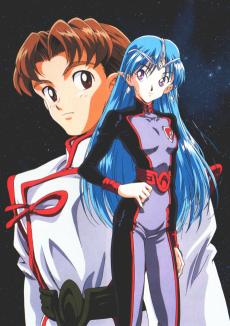 ANIME ActionSeikai no Monshou
ANIME ActionSeikai no Monshou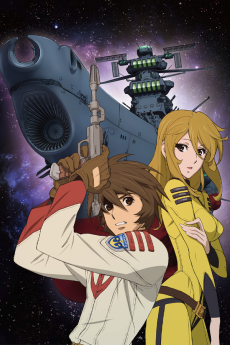 OVA ActionUchuu Senkan Yamato 2199
OVA ActionUchuu Senkan Yamato 2199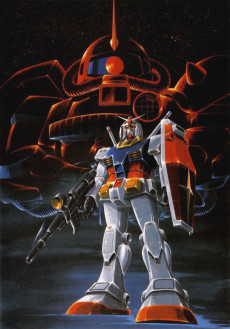 ANIME DramaKidou Senshi Gundam
ANIME DramaKidou Senshi Gundam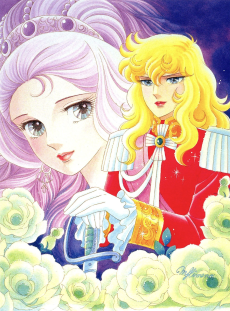 ANIME AdventureVersailles no Bara
ANIME AdventureVersailles no Bara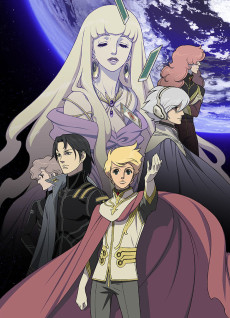 ANIME ActionTerra e... (TV)
ANIME ActionTerra e... (TV)
SCORE
- (4.4/5)
TRAILER
MORE INFO
Ended inMarch 17, 1997
Main Studio Kitty Film
Trending Level 2
Favorited by 4,584 Users

